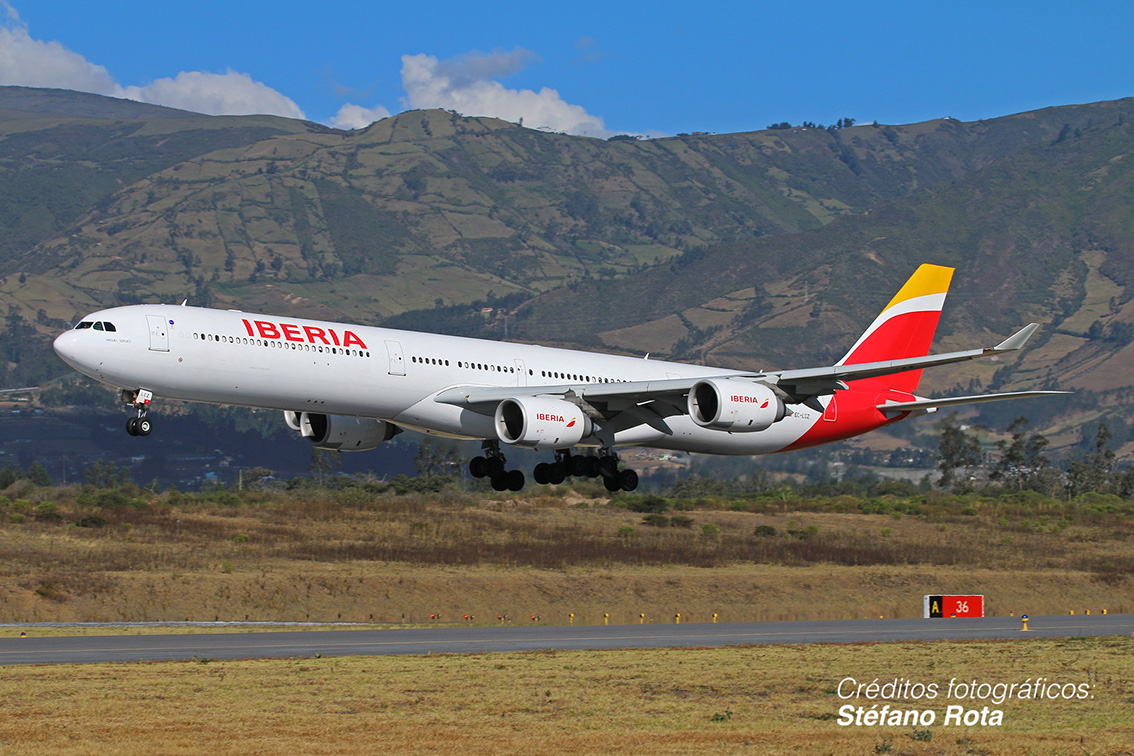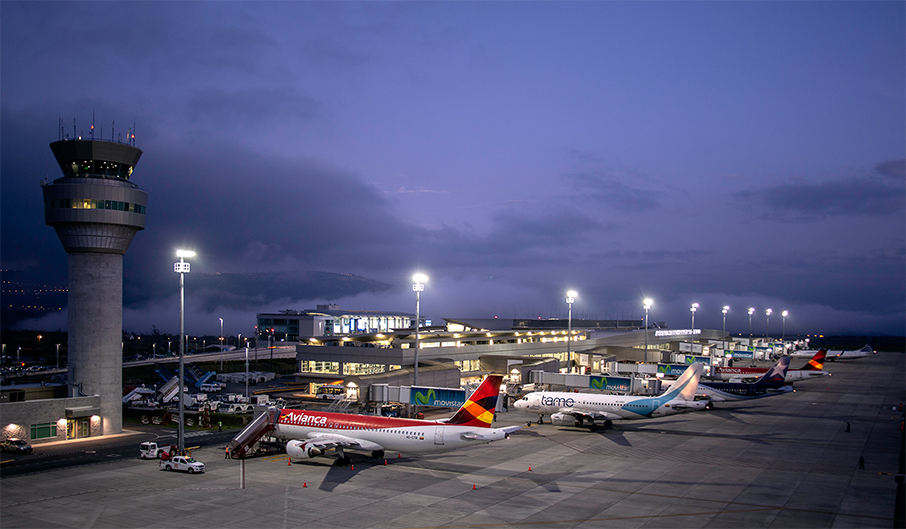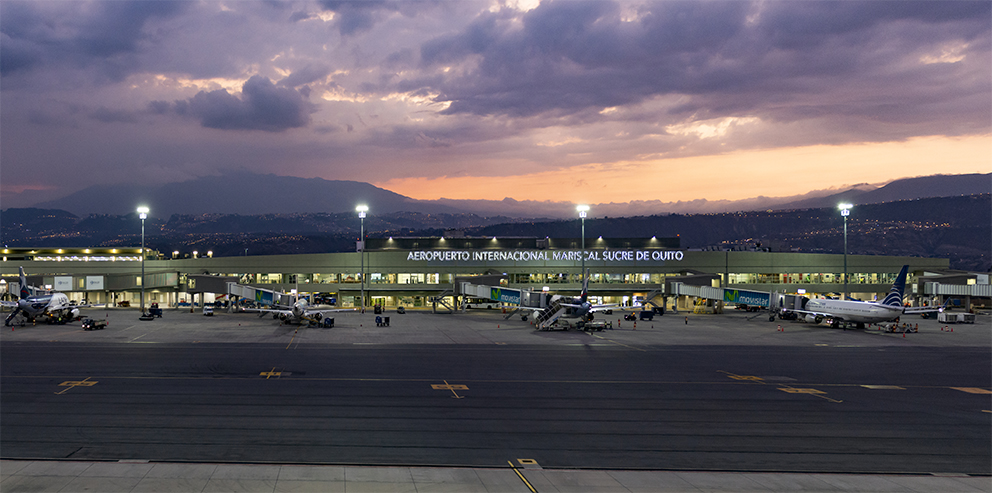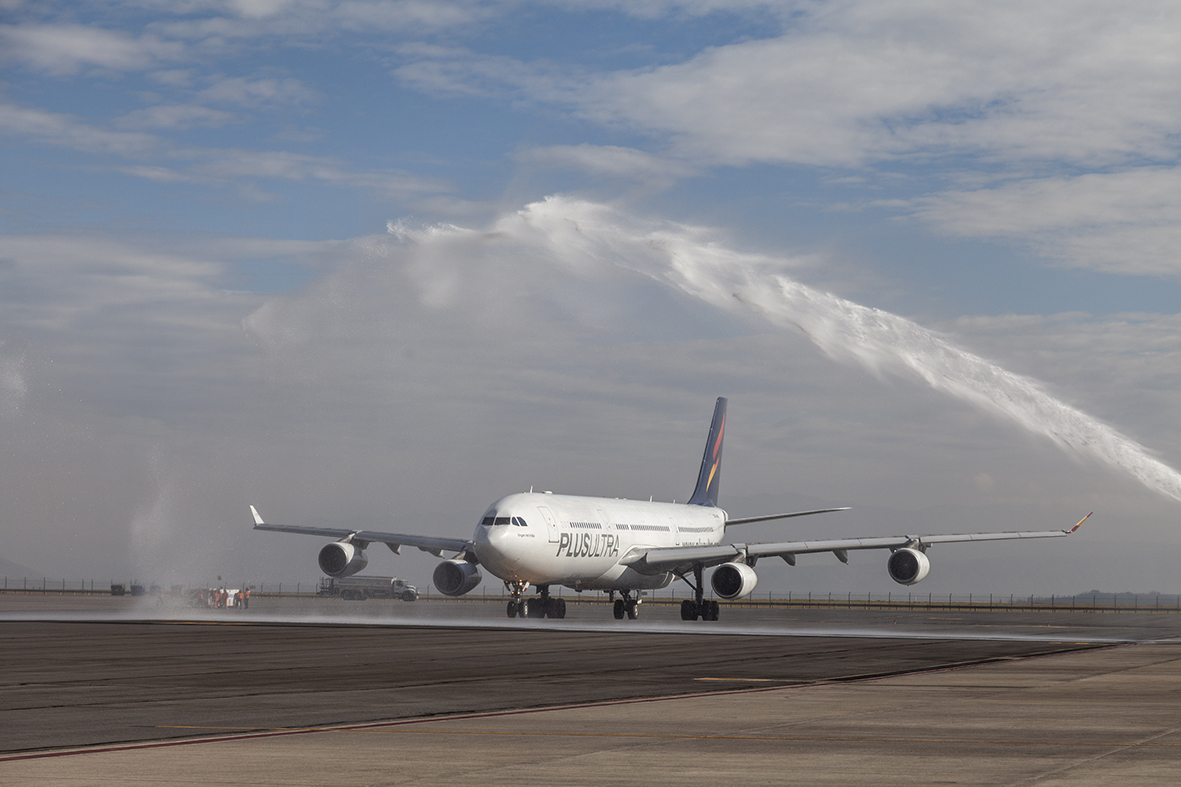Month: July 2019
IBERIA WILL FLY DIRECT SEVEN TIMES A WEEK BETWEEN QUITO AND MADRID

- Spain’s principal airline increases the frequency of flights to improve connectivity between the two capital cities.
- The Spanish airline bets on the Ecuadorian market; with this latest increase signifying a 16% increase in seats per year.
Iberia began its direct flights to Madrid from Quito Mariscal Sucre Airport on October 28, 2013, with three flights per week. In 2016 it doubled its flights and from July 1st this year it will offer one flight per day.
Iberia also presented its program “On Business”, which enables passengers to collect points and miles for future journeys, this way helping to strengthen commercial ties between Spain and Ecuador.
For Corporación Quiport, concessionaire of the Mariscal Sucre airport service, one of its strategic goals is to maintain solid relationships with airlines. The sustained increase in the city’s connectivity, which attracts new airlines, new destinations and more flights, is vitally important to provide passengers with a positive experience.
Corporación Quiport has worked continuously for airlines to increase their offer, in addition to bringing new destinations to Quito Airport, and this way improve connections with the city. “The conditions of the airport and Quito’s importance as a destination in the region have been decisive factors in important decisions taken by airlines” says Andrew O’Brian, President and CEO of Corporación Quiport.
The collaboration between airlines and Quiport makes it possible to offer quality services for those who visit Mariscal Sucre Airport. In Iberia’s case, the offer is not only focused on tourists, but also on the business community. The Spanish airline aims to support the growth in commercial ties between both countries, in line with the work of the national government and Quiport.
QUITO INTERNATIONAL AIRPORT CONTINUES TO STAND OUT WORLDWIDE

- For the sixth consecutive year Quito’s airport has been awarded South America’s Leading Airport title in the World Travel Awards.
- Corporación Quiport’s efforts are reflected in the high levels of prestige that the Mariscal Sucre has reached among its users and the air transport and tourism industries.
The awards ceremony of the World Travel Awards was held in one of the seven urban wonders of the world: La Paz – Bolivia; awards established in 1993 to recognize and celebrate those who stand out in the travel and tourism industry worldwide.
For Quiport, concessionaire of the Mariscal Sucre airport, being awarded for the sixth consecutive year the South America’s Leading Airportprize is the result of its management which delivers quality airport services, provides adequate infrastructure, safe procedures, efficient processes in compliance with national and international standards. As well as providing a positive experience for passengers and users.
The World Travel Awards (WTA), known as the tourism Oscars, “have maintained their position as the industry leader for the last 26 years and is the global reference point to reward excellence in travel and tourism,” as commented by Graham Cooke, founder of the WTA.
In South America, three countries lead awards list: Peru, Colombia and Ecuador. But on a global scale, Peru, Ecuador and Chile have been the only South American countries that have obtained distinctions.
For Andrew O’Brian, President and CEO of Quiport Corporation, “having implemented a culture of continuous improvement has allowed us to achieve increasingly higher standards and this is recognized by our passengers and users, as well as by the main players in the tourism industry in South America, placing the Mariscal Sucre as the leader of the region.”
THE FIRST HALF OF 2019 SEES IMPORTANT ACHIEVEMENTS FOR QUITO: MORE CONNECTIVITY, SUCCESSFUL SOCIAL AND ENVIRONMENTAL RESPONSIBILITY PROJECTS, AND ENHANCED SERVICES FOR USERS

- Quiport’s strategic work is reflected by its results.
- Strategic goals are a priority in the day-to-day operations at Mariscal Sucre Airport.
Having reached the end of the first half of 2019, Corporación Quiport, as a regional leader in theaviation industry and the company responsible for the construction, operation, maintenance and development of Mariscal Sucre International Airport in Quito, presents an evaluation of its management during this period.
Andrew O’Brian, President and CEO of Quiport, says that “this has been one of the best first semesters for Quiport and Quito Airport. We have added new airlines and more direct destinations, increasing the city’s connectivity and showing that Quito Airport is very competitive in the region. We have also achieved significant rates of growth in cargo with regards to the volume of exports by air”.
Quiport focuses on four strategic principles: the development of connectivity and aviation activities, customer service, investments, and social and environmental responsibility. Below, we breakdown the most relevant points in the company’s management of each of these areas.
Connectivity and Aviation Activities
Thanks to the route development work byCorporación Quiport and the support of the Ministry of Tourism, Ministry of Transport and Public Works, Municipality of Quito, Civil Aviation Authority of Ecuador and strategic partners of Quito International Airport, between January and June 2019, two new airlines and two destinations have been added to the Airport’s connectivity offering. The offer of flights to existing destinations has also been increased.
- Air France – Paris (new airline and new destination)
- LATAM – Santiago, Chile (new destination)
- Iberia – Madrid (increase from 6 to 7 weekly flights)
During this period, we also announced the upcoming launch of operations by Air Canada Rouge (Toronto), Plus Ultra (Madrid) and Peruvian (Lima).
At this halfway point, there are currently 15 airlines operating at Mariscal Sucre Airport.
In terms of cargo, 126,918 metric tons of cargo was moved through the airport, with exports accounting for 106,338 metric tons. We highlight the historic record achieved during the Valentine’s Day season, in which 18,548 metric tons of flowers were exported over the 20-day period, surpassing exports in 2018 by 6.9%.
In March, DHL, a global leader in courier transport, began regular operations at Quito Airport.
Regarding cargo, Quiport’s management was recognized by major stakeholders in the sector who awarded Quito Airport the Best Specialty Cargo Terminal in the world, Best Cargo Terminal in Latin America and the global winner of Best Cargo Terminal – in the 399,999 ton category.
As for operations, in March Quiport renewed its Aerodrome Certification for Mariscal Sucre Airport which was issued by the Civil Aviation Authority of Ecuador.
Customer Service
We are constantly on the look-out for opportunities to enhance the experience of our passengers and users, and we have made significant improvements and begun new projects to make Mariscal Sucre Airport a more welcoming and friendly space.
In January, we opened the redesigned Domestic VIP Lounge with modern decoration and a design focused on passenger comfort. The project to refurbish the Domestic VIP Lounge was led by Adriana Hoyos Design Studio and implemented by Octofast, resulting in an elegant aesthetic with 12% more capacity and offering the best experience to passengers at the Airport.
In fact, in March the ambiance and the service offered at the International VIP Lounge was awarded the Priority Pass Lounge of the Year – Global Winner. For the Lounge of the Year awards, votes across several categories are analyzed including business facilities, comfort, services offered by staff in the lounge and beverages. This year, the International VIP Lounge at Quito Airport achieved the top ranking in all these categories.
At the start of the year, Quri opened its doors in the international departures lounge. Operated by Travel Stores S.A., Quri (Quechua for gold) offers high quality artisanal goods such as jewelry, clothes made with native Ecuadorian designs and materials, food and premium products such as fine chocolates and a great variety of coffee.
Investments
During the first half of 2019, Quiport continued its planning and permit phase for the projects to expand the passenger terminal and commercial apron, and for improvements to the public halls in the Departures and Arrivals areas.
With an investment of US$ 70 million, these projects will increase the airport’s passenger capacity and provide an enhanced experience for users and passengers by providing state-of-the-start interior design using materials and design features to create a greater sense of belonging with the city and the country.
Environment
Environmental protection is one of Quiport’s main concerns, particularly with regards to reducing its carbon footprint.
The first half of the year has seen four high-impact projects:
Expansion of the wastewater treatment plant (WWTP)
To increase the capacity of industrial wastewater treatment, new facilities have been built with equipment to complement the existing stages of treatment. As a result, the process is now more efficient, and the quality of the water discharged by the plant exceeds international treatment standards.
Solar Energy Projects
An LED lighting system was installed along 505 m of pedestrian paths in public parking areas and accesses to the employee parking area. This system is supplied by solar energy from solar panels.
A solar energy system was installed with solar panels to power the water heating system in the Rescue and Fire Fighting Service building. The result makes it possible to increase the consumption of clean energy while reducing greenhouse gas (GHG) emissions.
LED lighting for public accesses and areas
One hundred standard lights were removed from the access road to Quito Airport and internal roads and were replaced by LED lights. These lights were installed in the existing metal posts. These lights have a longer useful life and are more energy efficient.
Reducing the Carbon Footprint
As part of the Airport’s plan to achieve carbon Neutrality, it is necessary to meet all the requirements of the Airport Carbon Accreditation (ACA) Program to reach the highest level of certification, 3+ Neutrality. Below, we list the actions taken:
- New training programs and outreach to commercial operators to resume the calculation of emissions and establish efficiency indicators for the reduction measures proposed in 2018.
- Re-calculate direct GHG emissions and demonstrate a reduction in the carbon footprint compared with the historic average in recent years.
- Define an effective offset process for direct emissions and emissions generated by air travel by Quiport executives. We aim to offset Quiport’s direct emissions by buying certified carbon credits.
- Develop new energy eco-efficiency projects to raise awareness about renewable energy and reduce energy consumption to continue our sustained efforts to reduce the carbon footprint.
Community Management
Based on a detailed analysis of the requirements and needs of the inhabitants of six parishes in the vicinity of the airport, Quiport carries out plans and programs to address the current social dynamic. This is part of its strategic goal to carry out responsible activities with the community.
The Public Consultation and Participation Plan helps to identify the interests and needs of the community. In the first half of the year, 201 meetings were held with the participation of 1,909 participants.
To support education, 64 scholarships were awarded to children and young people from low income or vulnerable homes. Also, 40 environmental education talks were given to 1,822 children. These talks addressed issues like biodiversity, environmental awareness, global warming and reforestation.
Another core part of social management based on community needs is employment training. Between January and June, 552 people received training in Basic Conversational English to open up job opportunities for them at the airport or in other areas.
To optimize and enhance the training program, at the end of June, Quiport opened the Training Center located within the airport’s facilities in order to centralize the training courses offered to each parish. The Training Center has four classrooms equipped with the technology required for the various courses: computers, audiovisual aids and internet access. These academic resources aim to reinforce the abilities of people living near the airport in areas such as customer service, conceptual cuisine, industrial safety, Basic Conversational English and Information Technologies.
As part of the “Compartamos” (Let’s Share) program, which encourages the reuse of used goods in good condition donated by companies that operate at Quito Airport, 15,434 persons benefitted from 32 deliveries of uniforms, work clothes and office furniture.
“With these management results, Corporación Quiport demonstrates its firm commitment to developing the connectivity of the city and the country, the expansion of airport infrastructure, as well as environmental protection and community development”, Andrew O’Brian concludes.
PLUS ULTRA LÍNEAS AÉREAS LAUNCHES ITS NEW ROUTE BETWEEN ECUADOR AND SPAIN TO CREATE CONNECTIONS AND UNITE PEOPLE

- Plus Ultra launched its operations this Friday, July 12. It is the latest Spanish airline that will encourage tourism and trade between Ecuador and Spain.
- Corporación Quiport’s management of Mariscal Sucre Airport has resulted in an airport service which has achieved prestige in the eyes of its users and the air transport industry.
As a result of the sustained implementation of the route development strategy for Mariscal Sucre Airport led by Corporación Quiport, this Friday, July 12 Plus Ultra Líneas Aéreas launched its inaugural flight on the Madrid-Quito route. The company will offer three weekly flights.
This morning, with its first group of passengers- including Cristóbal Roldán, Ambassador of Ecuador to Spain as the “first passenger of honor” – Plus Ultra launched the new route which aims to create connections and unite people.
The ceremony for the inaugural flight of Plus Ultra Líneas Aéreas was held at departure lounge A11 at Mariscal Sucre Airport in Tababela and was attended by authorities from tourism, air transport, Quito city council and representatives from Corporación Quiport and Plus Ultra.
“Since the start of our operation we have implemented a culture of improvement to reach ever higher standards. Plus Ultra will be an option to connect to a very important community for Ecuador and to strengthen relations with Spain, increasing tourism for the city and country”, says Andrew O’Brian, President and CEO of Corporación Quiport.
The anticipation for the start of operations has been reflected by the more than 10,000 reservations made before the launch, with a further 30,000 bookings expected by December, confirms Julio Martínez Solá, Executive Vice President of Plus Ultra in Spain, who also mentions that the aim of the Spanish airline is to “contribute to the tourism exchange between Spain and Ecuador”.
Rosi Prado de Holguín, Minister of Tourism, referred positively to the arrival of Plus Ultra in the country, “Ecuador warmly welcomes the Spanish airline Plus Ultra, which from today will shorten distances with its direct flight and will facilitate tourism and business opportunities between Spain and Ecuador”.
Plus Ultra will operate with an Airbus 340-300 with capacity for 303 passengers in economy and business class. The airline will seek to innovate in the way of travelling to Europe, allowing three bags per passenger.
“With our new route, from today we hope to encourage a virtuous exchange between our countries, to bring the best of Ecuador to Spain and the best of Spain to Ecuador”states Martínez Solá regarding the philosophy of Plus Ultra. “To create connections and unite people is our raison d’etre, and today is a great day as part of this great purpose. Our desired route between Ecuador and Spain launches today, with the aim to contribute to exchange between both countries.”
Before 8:00 a.m., the aircraft received a send-off with a water cannon salute, an aviation tradition. The aircraft was also blessed by father Abel Carvajal, the priest of the neighboring Yaruquí parish. The maiden flight took-off for Madrid with a layover in Guayaquil.
Quito International Airport is the main gateway to Ecuador. Thanks to its technical characteristics and teamwork between the state-owned company and Quiport, there has been a significant increase in connectivity for Quito and the country, fulfilling the common goal to encourage tourism, cultural exchange and the creation of new business opportunities for Ecuador.
CAPTUR APPOINTS ANDREW O’BRIAN, PRESIDENT OF QUIPORT, AS MEMBER OF ITS BOARD OF DIRECTORS.

On June 25, 2019, the Provincial Chamber of Tourism of Pichincha (CAPTUR) unanimously appointed Andrew O’Brian, President and CEO of Corporación Quiport S.A, as the new Principal Member of the Board of Directors.
“We are pleased to welcome Mr. Andrew O’Brian on account of his personal merits and those of the organization he represents, and we are confident that his commitment to the city and the tourism sector will strengthen our activities and be a strategic pillar for reaching the goals we have set ourselves as a Chamber and a representative of the tourism sector”, said Raúl García, president of the organization.
Mr. O’Brian commented that he is honored to join the Board of CAPTUR as a Principal Member and will give his best efforts to help tourism in the city and country. He explained “Quito International Airport is the main gateway for foreign tourists coming to the city and the province, which its why it is crucial for us to work together with the tourism sector and establish strategies to increase the number of visitors”.
The Provincial Chamber of Tourism of Pichincha is the highest representative of private tourism in the province, and groups together all the companies that work in the five areas of tourism recognized by the Special Law for Tourism Development and the Law on Chambers of Tourism and the National Tourism Federation:
- Hospitality, and accommodation;
- Travel agency operators;
- National and international air, land, maritime and river transport;
- Food and beverages, and
- Other tourism activities.
